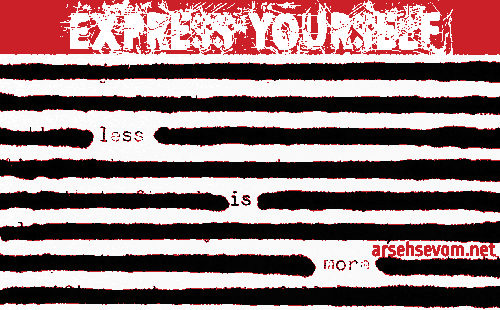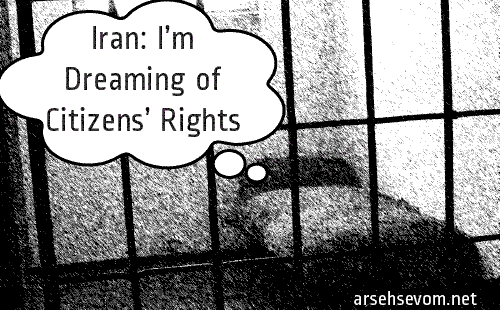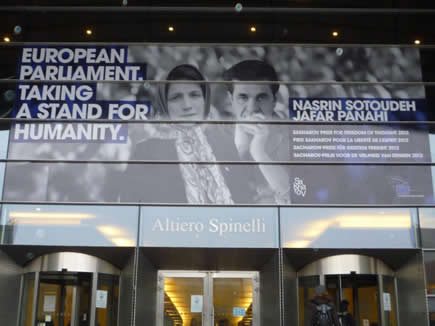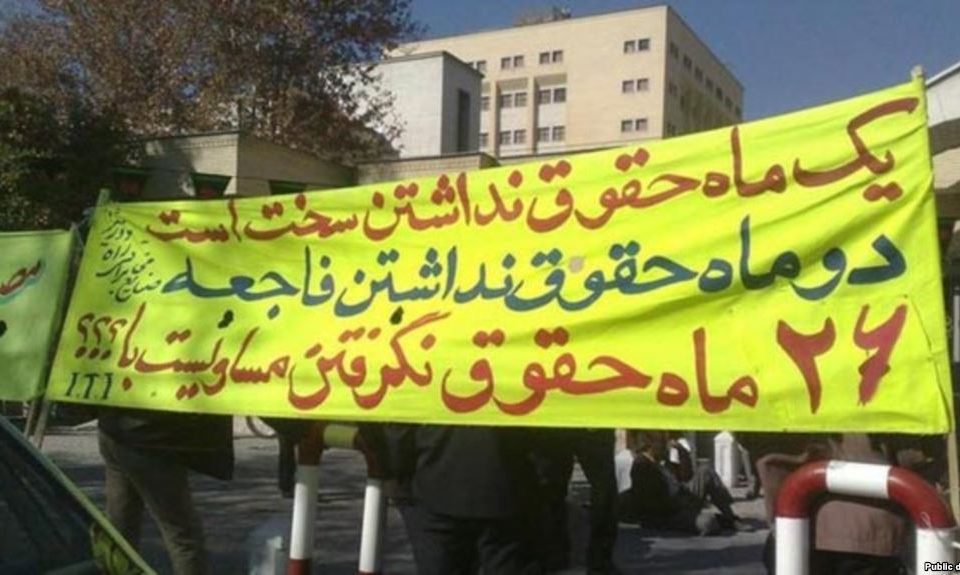
#Iran — Free Expression, Dream or Reality?
December 12, 2013
2013 Year in Review — #Iran and Its Civil Society
January 2, 2014Arseh Sevom—In this season of celebrations, we begin by wishing all our readers happy holidays. A Citizenship Rights Charter has been presented to the people of Iran. The charter, like the constitution of Iran, guarantees nothing in the end. It’s as substantial as a dream. Meanwhile, the interim nuclear deal seems to be doing little to change the economic reality for Iran’s population. An EU Delegation visited Iran for the first time in six years. Their meetings with Sakharov Prize Honorees Nasrin Sotouden and Jafar Panahi has led to protests from hardline factions.
by Peyman Majidzadeh
Citizenship Rights Charter
Since the beginning of Hassan Rouhani’s presidential term, observers have argued that the new government should pay more attention to the freedoms and rights of citizens. Rouhani took positive steps on foreign policy and the country’s nuclear case. However, his activities on domestic affairs have not been satisfactory at all. Executions have continued, people have been arrested on vague political charges, and minorities continue to be denied basic rights. In his 100-day report, Rouhani had almost nothing to say on human rights issues. It was obvious that more efforts were needed.
In reaction to demands, Rouhani’s administration released an unofficial draft of the Citizenship Rights Charter [fa]. The first question is: how useful or practical is the charter really? It contains three chapters and many articles on different issues including health and livelihood, freedom of expression and publication, access to information, privacy, rule of law, transparency, ownership, social security, justice, and education. Early evaluations [en] called the charter elegant and useless. Articles such as those related to privacy and freedom of expression are like a dream. The charter is filled with the term “insofar as it is within the framework of the law:” a phrase that puts practicability of the related articles under question. It is also full of vague terms, opening the door to interpretation.
Later comments made by analysts on the charter have not been positive. Shirin Ebadi, the 2003 Nobel Peace Laureate and human rights lawyer, said it “is in fact a tool to distract those who are waiting for justice to be carried out.” She might be right in saying that “basically, I don’t see the necessity for drafting this law, so I won’t give my opinion about its components one by one.” Was the charter really necessary? Or did the government publish it as a kind of diversion?
Just recently, the UN General Assembly approved a resolution on the human rights situation in Iran [en]. The resolution criticizes Iran for its human rights violations including torture and the frequent use of the death penalty. It calls for elimination of discrimination against women and members of ethnic minorities. It is obvious that the mere publication of Citizenship Rights Charter is not enough to respond positively and constructively to the resolution. Even appointment of a woman as the first female mayor [en] in the city Kalat does not resolve the problem. The issue of citizens’ rights and freedoms needs more attention. It takes time to institutionalize basic rights and freedoms and the charter can barely be regarded as an initial step. The problem is not the existence of law, but rather the lack of motivation or enforcement guarantees to adhere to already existing laws and regulations.
Sanctions Still Affect Iran’s Oil Exports
The Joint Plan of Action (JPA) between Iran and the world’s six major powers sparked hopes for financial progresses for Iran. However, the U.S. Energy Information Administration (EIA) says that Iran is unlikely to significantly increase its production or exports in the short term. According to the report, existing sanctions targeting Iran’s petroleum exports and imports prohibit large-scale investments and prevent the country from conducting financial transactions with US and Europe. It will be interesting to see a report released by the Iranian side on possible financial developments as a result of interim agreement.
Sanctions Bill
The interim nuclear agreement was signed about a month ago. Some were happy and some were upset after the deal. US senators were not happy, and no one expected them to keep quiet on the agreement. However, the senators’ reaction was faster than expected. They made their best efforts to prepare a bill on the issue: “Nuclear Weapon Free Iran Act.” The act targets Iranian oil exports and mining, engineering and construction industries. According to reports [en], the White House is ready to veto the bill.
Lawyer Maya Lester reports [en] that The European Council has confirmed an earlier ruling to remove two Iranian entities, namely the Fulmen Co. and Fereydoun Mahmoudian, from the sanctions list.
EU Parliament Delegation’s Meeting with Sotudeh and Panahi
Last week, a European parliament delegation visited Tehran for the first time since 2007. The visit was significant, signaling improvements in Iran-Europe relations. The delegation met with lawyer Nasrin Sotudeh and filmmaker Jafar Panahi, two former political prisoners, complicating the situation. After the meeting, which took place in the Greek Embassy, a number of Iran’s hardliners called for further investigation on the issue. The head of Iran’s Administrative Justice Court, Mohammad Jaffar Montazeri, called Sotudeh and Panahi “seditionists” and said “it needs to become clear who made this meeting possible.” Mohammad Hassan Asfari, a member of the Iranian parliament’s National Security and Foreign Affairs Committee, said “Parliament will carefully pursue the matter.”
Nasrin Sotudeh and Jafar Panahi won 2012 Sakharov Prize for freedom of thoughts.
A Medicated Population
Statistics on Iran’s consumption of medication reveal worrying information. According to the studies [fa], the number of medications consumed in the country has increased from 2.16 billion in 2000 to 5.33 billion in 2012, an alarming growth of 106%. Meanwhile, the average growth rate of domestic production has decreased by 41%. The report provides detailed statistics on different aspects of the issue. It can be concluded that the country needs to utilize modern technology, pricing system, and anti-smuggling approaches in order to become independent in the production of medications. The current approach leads to nowhere.






